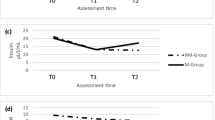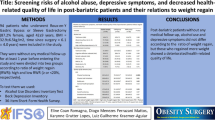Abstract
Purpose
This study aims to examine associations between metabolic profile and psychological variables in post-bariatric patients and to investigate if metabolic and psychological variables, namely high-density lipoprotein cholesterol (HDL-C), triglycerides (TG), glycated hemoglobin (HbA 1c), impulsivity, psychological distress, depressive and eating disorder symptoms are independently associated with percentage of excess weight loss (%EWL) after bariatric surgery.
Methods
One hundred and fifty bariatric patients (BMI = 33.04 ± 5.8 kg/m2) who underwent to bariatric surgery for more than 28.63 ± 4.9 months were assessed through a clinical interview, a set of self-report measures and venous blood samples. Pearson’s correlations were used to assess correlations between %EWL, metabolic and psychological variables. Multiple linear regression was conducted to investigate which metabolic and psychological variables were independently associated with %EWL, while controlling for type of surgery.
Results
Higher TG blood levels were associated with higher disordered eating, psychological distress and depression scores. HDL-C was associated with higher depression scores. Both metabolic and psychological variables were associated with %EWL. Regression analyses showed that, controlling for type of surgery, higher % EWL is significantly and independently associated with less disordered eating symptoms and lower TG and HbA_1c blood concentrations (R 2 aj = 0.383, F (4, 82) = 14.34, p < 0.000).
Conclusion
An association between metabolic and psychological variables, particularly concerning TG blood levels, disordered eating and psychological distress/depression was found. Only higher levels of disordered eating, TG and HbA_1c showed and independent correlation with less weight loss. Targeting maladaptive eating behaviors may be a reasonable strategy to avoid weight regain and optimize health status post-operatively.
Similar content being viewed by others
References
Morgen CS, Sørensen TIA (2014) Obesity: global trends in the prevalence of overweight and obesity. Nat Rev Endocrinol 10:513–514. doi:10.1038/nrendo.2014.124
Langer FB, Prager J, Poglitsch M et al (2013) Weight loss and weight regain-5-year follow-up for circular- versus linear-stapled gastrojejunostomy in laparoscopic roux-en-Y gastric bypass. Obes Surg 23:776–781
Odom J, Zalesin KC, Washington TL et al (2010) Behavioral predictors of weight regain after bariatric surgery. Obes Surg 20:349–356
Buchwald H, Oien DM (2009) Metabolic/bariatric surgery worldwide 2008. Obes Surg 19:1605–1611
Courcoulas AP, Nicholas C, Belle S et al (2013) Weight change and health outcomes at 3 years after bariatric surgery among individuals with severe obesity. J Am Med Assoc 310:2416–2425. doi:10.1001/jama.2013.280928
Buchwald H, Avidor Y, Braunwald E et al (2004) Bariatric surgery: a systematic review and meta-analysis. JAMA 292:1724–1737
Teufel M, Rieber N, Meile T et al (2012) Body image after sleeve gastrectomy: reduced dissatisfaction and increased dynamics. Obes Surg 22:1232–1237. doi:10.1007/s11695-012-0690-4
Van Hout G, Van Heck G (2009) Bariatric psychology, psychological aspects of weight loss surgery. Obes Facts 2:10–15. doi:10.1159/000193564
de Zwaan M, Enderle J, Wagner S et al (2011) Anxiety and depression in bariatric surgery patients: a prospective, follow-up study using structured clinical interviews. J Affect Disord 133:61–68
Jiménez A, Casamitjana R, Flores L et al (2012) Long-term effects of sleeve gastrectomy and Roux-en-Y gastric bypass surgery on type 2 diabetes mellitus in morbidly obese subjects. Ann Surg 00:1. doi:10.1097/SLA.0b013e318262ee6b
Brethauer SA, Aminian A, Romero-Talamás H et al (2013) Can diabetes be surgically cured?: long-term metabolic effects of bariatric surgery in obese patients with type 2 diabetes mellitus. Ann Surg 258:628–637. doi:10.1016/j.biotechadv.2011.08.021.Secreted
Ikramuddin S, Buchwald H (2011) How bariatric and metabolic operations control metabolic syndrome. Br J Surg 98:1339–1341. doi:10.1002/bjs.7652
Kaur J (2014) A comprehensive review on metabolic syndrome. Cardiol Res Pract. doi:10.1155/2014/943162
Strain GW, Saif T, Ebel F et al (2015) Lipid profile changes in the severely obese after laparoscopic sleeve gastrectomy (LSG), 1, 3, and 5 years after surgery. Obes Surg 25:285–289. doi:10.1007/s11695-014-1351-6ORIGINAL
Corradini SG, Eramo A, Lubrano C et al (2005) Comparison of changes in lipid profile after bilio-intestinal bypass and gastric banding in patients with morbid obesity. Obes Surg 15:367–377. doi:10.1381/0960892053576839
Myers VH, Adams CE, Barbera BL, Brantley PJ (2012) Medical and psychosocial outcomes of laparoscopic Roux-en-Y gastric bypass: cross-sectional findings at 4-year follow-up. Obes Surg 22:230–239. doi:10.1007/s11695-010-0324-7
Ortega E, Morínigo R, Flores L et al (2012) Predictive factors of excess body weight loss 1 year after laparoscopic bariatric surgery. Surg Endosc Other Interv Tech 26:1744–1750. doi:10.1007/s00464-011-2104-4
Beck NN, Mehlsen M, René KS et al (2012) Psychological characteristics and associations with weight outcomes 2 years after gastric bypass surgery: postoperative eating disorder symptoms are associated with weight loss outcomes. Eat Behav 13:394–397
Elfhag K, Morey LC (2008) Personality traits and eating behavior in the obese: poor self-control in emotional and external eating but personality assets in restrained eating. Eat Behav 9:285–293. doi:10.1016/j.eatbeh.2007.10.003
Niego SH, Kofman MD, Weiss JJ, Geliebter A (2007) Binge eating in the bariatric surgery population: a review of the literature. Int J Eat Disord 40:349–359
Conceição E, Bastos A, Brandao I et al (2013) Loss of control eating and weight outcomes after bariatric surgery: a study with a Portuguese sample. Eat Weight Disord 19(1):103–109. doi:10.1007/s40519-013-0069-0
Conceição E, Mitchell JE, Engel SG et al (2014) What is grazing? Reviewing its definition, frequency, clinical characteristics, and impact on bariatric surgery outcomes, and proposing a standardized definition. Surg Obes Relat Dis 10:973–982. doi:10.1016/j.soard.2014.05.025
Saunders R (2004) Grazing: a high-risk behavior. Obes Surg 14:98–102. doi:10.1381/096089204772787374
Van Hout GCM, Verschure SKM, van Heck GL (2005) Psychosocial predictors of success following bariatric surgery. Obes Surg 15:552–560. doi:10.1381/0960892053723484
Sarwer DB, Dilks Rebecca J, West-Smith L (2011) Dietary intake and eating behavior after bariatric surgery: threats to weight loss maintenance and strategies for success. Surg Obes Relat Dis 7:644–651
Van Hout G (2005) Psychosocial effects of bariatric surgery. Acta Chir Belg 105:40–43
Vaz Serra A, Pio Abreu J (1973) Aferição dos quadros clínicos depressivos. I—Ensaio de aplicação do Inventário Depressivo de Beck a uma amostra portuguesa de doentes deprimidos. Coimbra Med XX:623–644
Machado PP, Martins C, Vaz A et al (2014) Eating disorder examination questionnaire (EDE-Q): psychometric properties and norms for the portuguese population. Eur Eat Disord Rev. doi:10.1002/erv.2318
Patton JH, Stanford MS, Barratt ES (1995) Factor structure of the barratt impulsiveness scale. J Clin Psychol 51:768–774
Lambert MJ, Burlingame GM, Umphress V et al (1996) The reliability and validity of the outcome questionnaire. Clin Psychol Psychother 3:249–258
Deitel M, Gawdat K, Melissas J (2007) Reporting weight loss. Obes Surg 17:565–568
Stoney CM, West SG, Hughes JW et al (2002) Acute psychological stress reduces plasma triglyceride clearance. Psychophysiology 39:80–85. doi:10.1017/S0048577202010284
Rosmond R (2005) Role of stress in the pathogenesis of the metabolic syndrome. Psychoneuroendocrinology 30:1–10. doi:10.1016/j.psyneuen.2004.05.007
Kinder LS (2004) Depression and the metabolic syndrome in young adults: findings from the third national health and nutrition examination survey. Psychosom Med 66:316–322. doi:10.1097/01.psy.0000124755.91880.f4
Clum GA, Rice JC, Broussard M et al (2014) Associations between depressive symptoms, self-efficacy, eating styles, exercise and body mass index in women. J Behav Med 37:577–586. doi:10.1007/s10865-013-9526-5
Kenardy J, Mensch M, Bowen K et al (2002) Group therapy for binge eating in type 2 diabetes: a randomized trial. Diabet Med 19:234–239
Johnson RK, Appel LJ, Brands M et al (2009) Dietary sugars intake and cardiovascular health a scientific statement from the american heart association. Circulation 120:1011–1020. doi:10.1161/CIRCULATIONAHA.109.192627
Toft U, Kristoffersen LH, Lau C et al (2007) The dietary quality score: validation and association with cardiovascular risk factors: the Inter99 study. Eur J Clin Nutr 61:270–278. doi:10.1038/sj.ejcn.1602503
Psota TL, Lohse B, West SG (2007) Associations between eating competence and cardiovascular disease biomarkers. J Nutr Educ Behav 39:S171–S178. doi:10.1016/j.jneb.2007.05.004
Tanofsky-Kraff M, Shomaker LB, Stern EA et al (2012) Children’s binge eating and development of metabolic syndrome. Int J Obes Lond 36:956–962. doi:10.1038/ijo.2011.259
Jenkins D, Ocana A, Jenkins A et al (1992) Metabolic advantages of spreading the nutrient load: effects of increased meal frequency in non-insulin-dependent diabetes. Am J Clin Nutr 55:461–467
Taylor AE, Hubbard J, Anderson EJ (1999) Impact of binge eating on metabolic and leptin dynamics in normal young women. J Clin Endocrinol Metab 84:428–434. doi:10.1210/jcem.84.2.5502
Kral JG, Buckley MC, Kissileff HR, Schaffner F (2001) Metabolic correlates of eating behavior in severe obesity. Int J Obes Relat Metab Disord 25:258–264. doi:10.1038/sj.ijo.0801469
Schag K, Schönleber J, Teufel M et al (2013) Food-related impulsivity in obesity and binge eating disorder: a systematic review. Obes Rev 14:477–495. doi:10.1111/obr.12017
Wilson PWF, Grundy SM (2003) The metabolic syndrome. A practical guide to origins and treatment, part II. Circulation 108:1537–1540. doi:10.1161/01.CIR.0000089506.12223.F1
Conceição E, Mitchell JE, Vaz A et al (2014) The presence of maladaptive eating behaviors after bariatric surgery in a cross sectional study: importance of picking or nibbling on weight regain. Eat Behav 15:558–562. doi:10.1016/j.eatbeh.2014.08.010
Roehrig M, Masheb RM, White M, Grilo CM (2009) The metabolic syndrome and behavioral correlates in obese patients with binge eating disorder. Obes Silver Spring 17:481–486. doi:10.1038/oby.2008.560
White M, Kalarchian M, Masheb RM et al (2010) Loss of control over eating predicts outcomes in bariatric surgery: a prospective 24-month follow-up study. J Clin Psychiatry 71:175–184. doi:10.4088/JCP.08m04328blu.Loss
Acknowledgments
This research was partially supported by Fundação para a Ciência e a Tecnologia/Foundation for Science and Technology through European Union COMPETE program Grant to Eva Conceição (IF/01219/2014) and (PTDC/MHC-PCL/4974/2012), doctoral scholarship (SFRH/BD/104159/2014) to Ana Pinto-Bastos and doctoral scholarship (SFRH/BD/104182/2014) to Sofia Ramalho.
Conflict of interest
On behalf of all authors, the corresponding author states that there is no conflict of interest.
Ethical approval
All procedures performed in studies involving human participants were in accordance with the ethical standards of the institutional and/or national research committee and with the 1964 Helsinki declaration and its later amendments or comparable ethical standards.
Informed consent
Informed consent was obtained from all individual participants included in the study.
Author information
Authors and Affiliations
Corresponding author
Rights and permissions
About this article
Cite this article
Brandão, I., Ramalho, S., Pinto-Bastos, A. et al. Metabolic profile and psychological variables after bariatric surgery: association with weight outcomes. Eat Weight Disord 20, 513–518 (2015). https://doi.org/10.1007/s40519-015-0199-7
Received:
Accepted:
Published:
Issue Date:
DOI: https://doi.org/10.1007/s40519-015-0199-7




